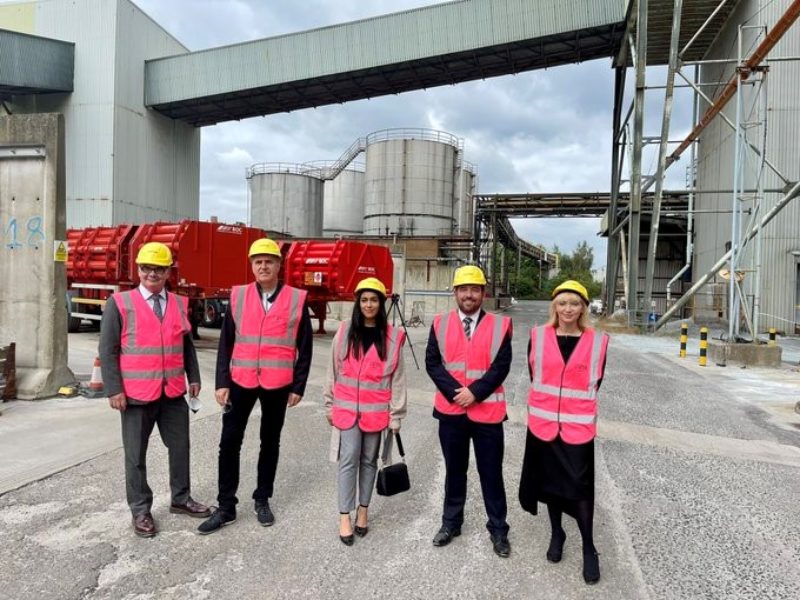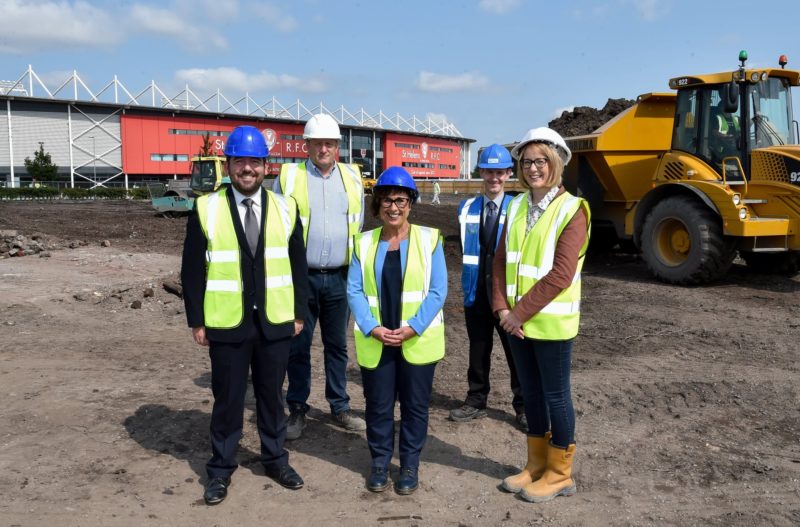
Two world-first projects are underway here in St Helens, putting our borough and the Liverpool City Region at the forefront of the green industrial revolution.
Essential preparatory work for the ground-breaking £54m Glass Futures development in St Helens has begun.
Located on brownfield land on the edge of St Helens town centre next to the Totally Wicked Stadium, Glass Futures will be a 160,000 sq. ft Centre of Excellence, looking at how carbon can be reduced from the glass production process – an industry the borough is world-famous for.
Landowner and developer Network Space has appointed Civil & Remediation Ltd, an earthworks and remediation contractor to prepare the wider site for future development and significant progress is being made on site. This challenging site that was once a colliery before becoming a glassworks, has left a legacy of heavy metal concentrations together with gas and asbestos contamination.
The necessary works to make the site suitable and safe for future use will have caused some disruption to neighbours, for which their patience and understanding is very much appreciated. This phase of the project will now take around a month to complete before the main construction works start in late autumn.
The development is backed by Labour-led St Helens Borough Council who committed funding to cover pre-planning and planning costs – while the scheme also received a major boost after Network Space secured a £9m contribution from the Liverpool City Region Combined Authority. This collaborative approach with Network Space has enabled the acceleration of this project from concept to delivery.
Commenting at a recent site visit (pictured below), St Helens Borough Council Leader David Baines said: “A number of major cities and towns around the country wanted to bring this innovative Glass Futures project to their area, so for it to come to St Helens speaks volumes of the influence we still have in the world of glass making.
“A lot of work has been put in by the council and other partners to get this off the ground at record pace, so to be here to see preparation work start is a proud moment for me and a step closer to our dream becoming a reality.”
Councillor Richard McCauley, Cabinet Member for Regeneration and Planning at St Helens Borough Council, added: “St Helens is steeped in glass manufacturing, and we want to keep it that way and at the heart of global innovation – and having Glass Futures here will put us at the centre of sustainable glass making for decades to come which also supports our climate emergency declaration.
“These are very exciting times for the whole borough, and I am sure this will be the first of many exciting and ambitious schemes that will be coming forward in St Helens over the coming months.”
Glass Futures is expected to be completed in 2022, bringing a number of high-skilled jobs to St Helens. For more information, visit: www.glass-futures.org/

In another world-first for St Helens, joining the internationally significant Glass Futures project now underway, trials have started here to produce float (sheet) glass using hydrogen.
The natural gas fossil fuel, normally used in the manufacturing process, will be completely replaced with hydrogen – showing how industry can significantly cut carbon emissions and take a big step towards reaching net zero.
The trials are taking place at Pilkington almost 200 years after they first began making glass in St Helens in 1826.
Council Leader David Baines says: “It was fantastic to visit the site this week alongside Metro Mayor Steve Rotheram, our Cabinet Member for Environment and Transport Cllr Andy Bowden, and our Climate Change Champion Councillor Mancyia Uddin.
Not just as Leader of St Helens Borough Council but also as City Region Portfolio Holder for Climate Emergency and Renewable Energy, this is an issue we take very seriously. It was great to be joined by my deputy portfolio holder Cllr Gillian Wood from Wirral for the visit to see this world-first trial.”
In order for the UK to decarbonise, complete transformation of almost every sector of the economy is required. Industry accounts for around 25% of all the UK’s greenhouse gas emissions and reducing these emissions is vital if the country is to reach ‘net zero’.
However, cleaning up energy intensive industry is one of the toughest challenges to meet. Emissions from industry, such as glass making, can be especially hard to reduce – a barrier which is one step closer to being overcome through this trial.
The ground-breaking ‘HyNet Industrial Fuel Switching’ project, led by Progressive Energy, with hydrogen being provided by BOC based here in St Helens, will provide confidence that low carbon hydrogen from HyNet can replace natural gas. This is believed to be the first large-scale demonstration of 100% hydrogen firing in a live float (sheet) glass production environment anywhere in the world.
HyNet will begin to decarbonise the North West from 2025. By 2030, it will be capable of removing up to 10 million tonnes of carbon from across North West England and North East Wales each year – the equivalent of taking four million cars off the road annually.
Find out more about HyNet: https://hynet.co.uk/
